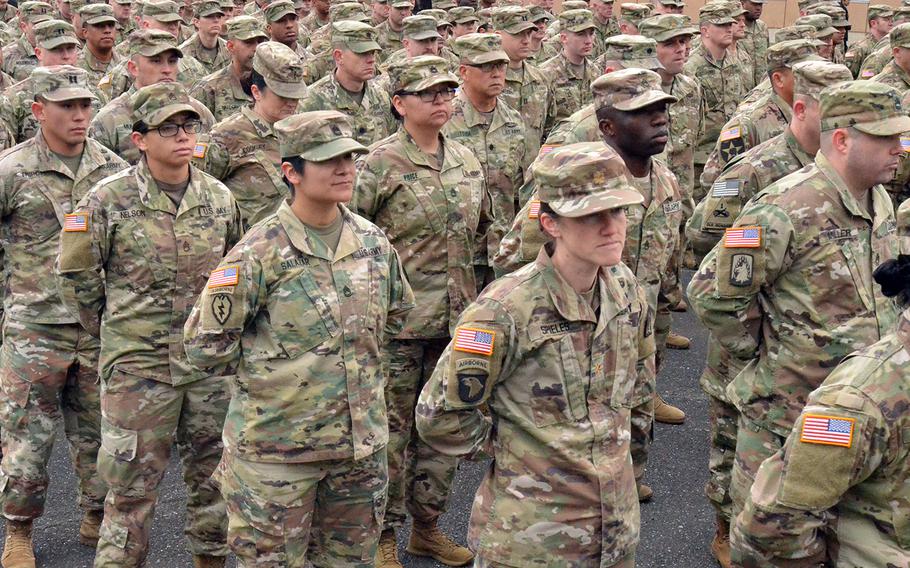
U.S. soldiers stand in formation during a ceremony to kick off the Yama Sakura exercise at Camp Asaka, Tokyo, Dec. 9, 2019. (Seth Robson/Stars and Stripes)
YOKOTA AIR BASE, Japan — Thousands of troops may be redeployed to the Indo-Pacific under a plan to reduce U.S. forces in Germany, according to the White House’s national security adviser.
President Donald Trump announced last week his intentions of cutting troop levels in Germany from 34,500 to 25,000. He said the country, where the U.S. has stationed troops since 1945, has shortchanged the United States on trade and defense, and that he will reduce troop numbers “until they pay” more.
The move has been criticized by lawmakers in Germany and in the United States, including members of the Republican Party.
In a commentary published Monday in the Wall Street Journal, national security adviser Robert O’Brien wrote that no official announcement has been made, details of any troop moves remain under development and that military leaders are working on options.
“The Cold War practice of garrisoning large numbers of troops with their families on massive bases in places like Germany is now, in part, obsolete,” he wrote. “While air bases and logistics hubs remain important, the Cold War-style garrisoning of troops makes less military and fiscal sense than it did in the 1970s.”
Several thousand troops in Germany may be reassigned to other countries in Europe and others may return to the United States. Thousands more may be sent to the Indo-Pacific region, where the U.S. maintains a military presence in Japan, South Korea and Singapore, as well as rotational deployments to spots like Australia, O’Brien wrote.
“In that theater, Americans and allies face the most significant geopolitical challenge since the end of the Cold War,” he wrote.
Ross Babbage, a former Australian assistant defense secretary, said in a telephone interview Tuesday that the proposal would be welcomed by Australians.
“It’s putting meat on the bones of the [Pacific] pivot announced by [President Barack Obama] back in 2011,” he said, referring to a policy of concentrating America’s military and diplomatic efforts in the Far East.
“What has been happening is a lot of acceleration to deal with the rise of China and the attendant risks there are of tension and conflict in this region,” he said.
There’s a need to reinforce the U.S. presence in the region to enhance confidence in the U.S. and western allies generally, Babbage said.
“I don’t think we are talking about big numbers in short time but it’s reasonable to include Australia on a list of places where people might go,” he said, adding that such a move would likely have bipartisan political and public support in Australia.
Moving more troops to Asia makes sense, said Cord Scott, a University of Maryland Global Campus Asia professor who teaches history, film and government on U.S. bases in South Korea.
“More of a direct threat would be toward players or actors here in Asia especially with what’s happening, tensions now rising between India and China,” he said by phone Tuesday.
A mobile force in the Far East can respond to crisis related to sea territory disputes or the Korean Peninsula, Scott added.
“The economic and military threat is in Asia,” he said. “It makes sense to have more troops here in that regard.”
However, Robert Dujarric, codirector of the Institute of Contemporary Asian Studies at Temple University in Tokyo, said the move is a bad idea that’s part of the president’s ongoing war against institutions, such as NATO, that he views as anti-American.
“Withdrawal of troops from Germany has nothing to do with helping defend Asia,” Dujarric said by phone Tuesday. “Trump has a problem with NATO.”
Stars and Stripes reporter Hana Kusumoto contributed to this report.
robson.seth@stripes.com Twitter: @SethRobson1